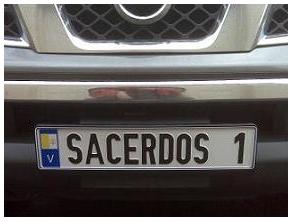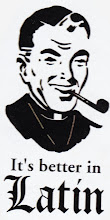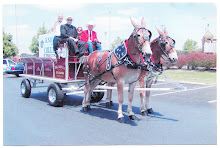I came across an article from our friends at the FSSP who have produced what is - in my estimation - a pretty clear and insightful rationale for celebrating the Mass "ad orientem." Here it is...

(Originally from the June, 2011 Fraternity Newsletter)
There are scientific ways of knowing the identity of a person, such as fingerprinting, retinal scans, or DNA analysis; however, in everyday life, the identity of a person is by his face. It may happen that we see a person from behind or from a distance and think we know who it is, but until we see the face, the identity of the person can remain in doubt.
The human face is so unique that, except for identical twins, we instantly know who a person is merely by sight of it. Furthermore, we often associate everything we know about the person by the face. His abilities, personality, and past shared experiences become so much a part of his face so that even the person’s reputation and name are tied to it.
By means of the face, we also ascertain how a person must be feeling at the moment. The countenance indicates whether a person is sad, upset, content, or joyful. Likewise, the face expresses what is even deeper inside the person, such as moods, dispositions, likes, and dislikes.
Close contact with the face of another person expresses intimate love, while not showing one’s face or “turning one’s back” on another person expresses anger, disappointment, or contempt.
A conversation is personal when conducted face-to-face, but the same conversation loses its familiarity when the parties are speaking on the telephone or across the room from each other. Talking while being occupied with something else is considered not giving our full attention, and speaking with one’s back towards the person is considered rude or insulting.
Turning, then, to our conversation with God — prayer — it is best realized only in Heaven where it will be face-to-face, but until then, it helps to picture the Person with Whom we are conversing. Hence, while praying, when the mind focuses upon an image of God, whether internally or externally, we better maintain our attention.
In order to assist us at the greatest prayer, Holy Mass, we face the Altar upon which the Sacrifice of Calvary is made present, and, together with the priest, we adore and beseech God. The entire congregation and priest focuses upon God, and our posture and visage are directed in such a way as to face the One with Whom we are speaking. As a result, the posture of the faithful should not be considered as facing the priest; rather, facing God, since Mass is not a conversation with the celebrant, but the Triune God.
While the priest offers Mass, he does everything possible to show respect, maintain attention, and not lose sight of the great action before him while he concentrates upon the prayers given him to say. To assist him, he faces heavenward, beseeching the Blessed Trinity on behalf of his flock.
Thus, he does not have his back turned towards the people; rather, the priest is facing the same direction as the rest of the community who are facing God. As we do not take offense by the person who has his back towards us in the pew in front of us, so too, there is no offense when the priest has his back towards us as we are all praying to the same Blessed Trinity, and all faces are directed toward Him to Whom we are speaking.
To take this analogy one step further, if, perchance, the person in the pew in front of us turned around and faced us, we would expect him to say something. Likewise, when the priest at Mass turns towards us, we expect his words to be directed at us; otherwise, it is obvious that he is speaking to someone else at those times he is faced in the same direction as everyone else in the church.
By having the priest face God during Mass, there is the additional benefit of the identity of his human nature diminishing when his face is not seen. During Mass, the priest acts in persona Christi, so that the less we see the face of the priest, the more his personality and identity subside. Consequently, our minds more easily focus upon the occurring holy actions and sacred mysteries as we avoid attention given to any concomitant human elements.
As mentioned above, at those times when the priest faces the faithful, such as the sermon, we instantaneously realize to whom these words are directed. However, to avoid the atmosphere becoming too “humancentric,” the priest maintains a dignified mannerism even at these times, in imitation of Christ preaching to the faithful of His time.
Yet, arriving at the most solemn parts of Mass, when our attention is most directed towards God (ad orientem), all our efforts—internal and external—are united in adoring and praising the Triune God in the most sublime and reverent manner.
Awaiting, then, the happy state of the elect who see God face-to-face in the beatific vision, our conversing with God on earth ought to be shown by humble and reverent attention, love, and devotion. Doing so will prepare our soul never to lose sight of God for all eternity.






















